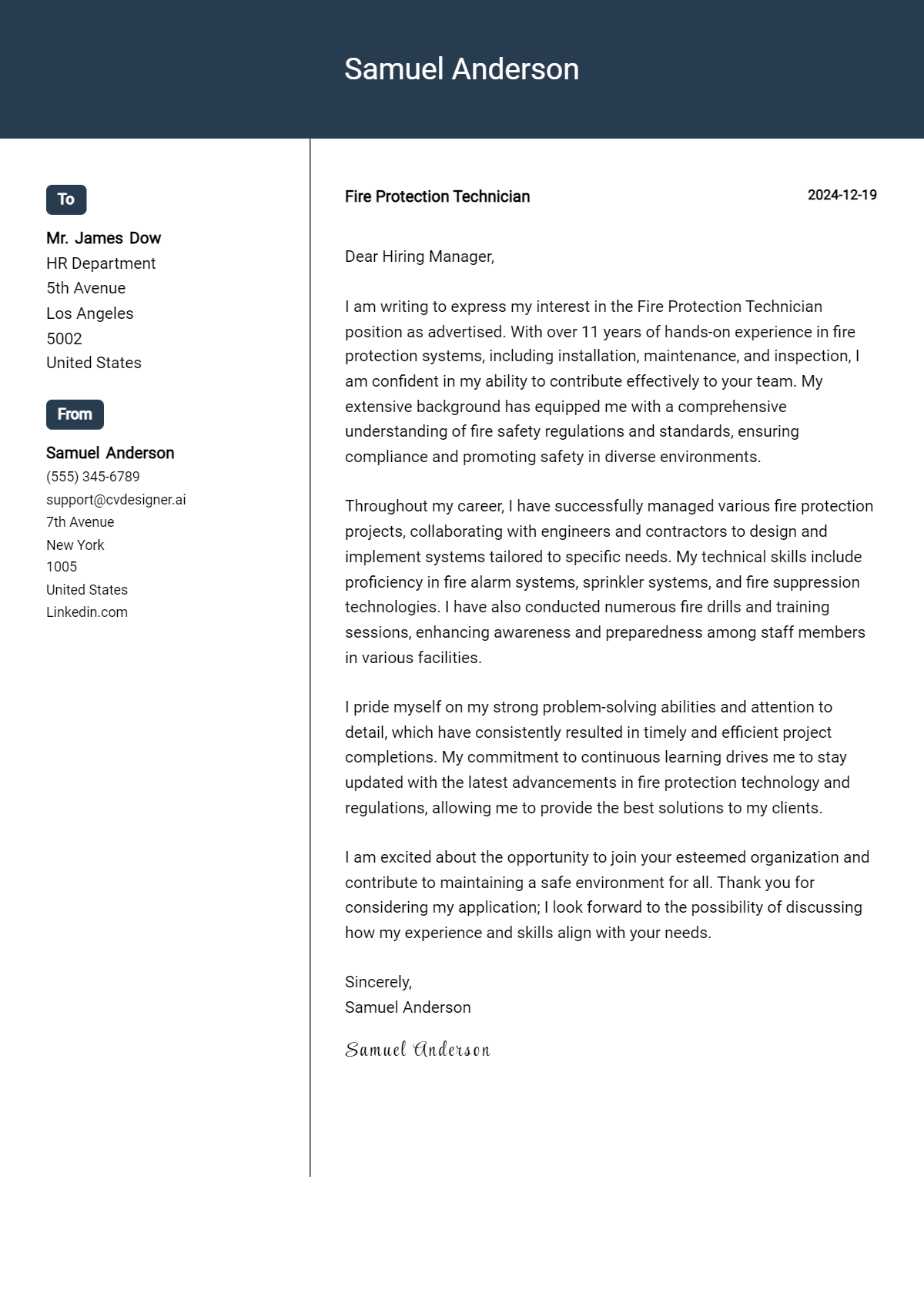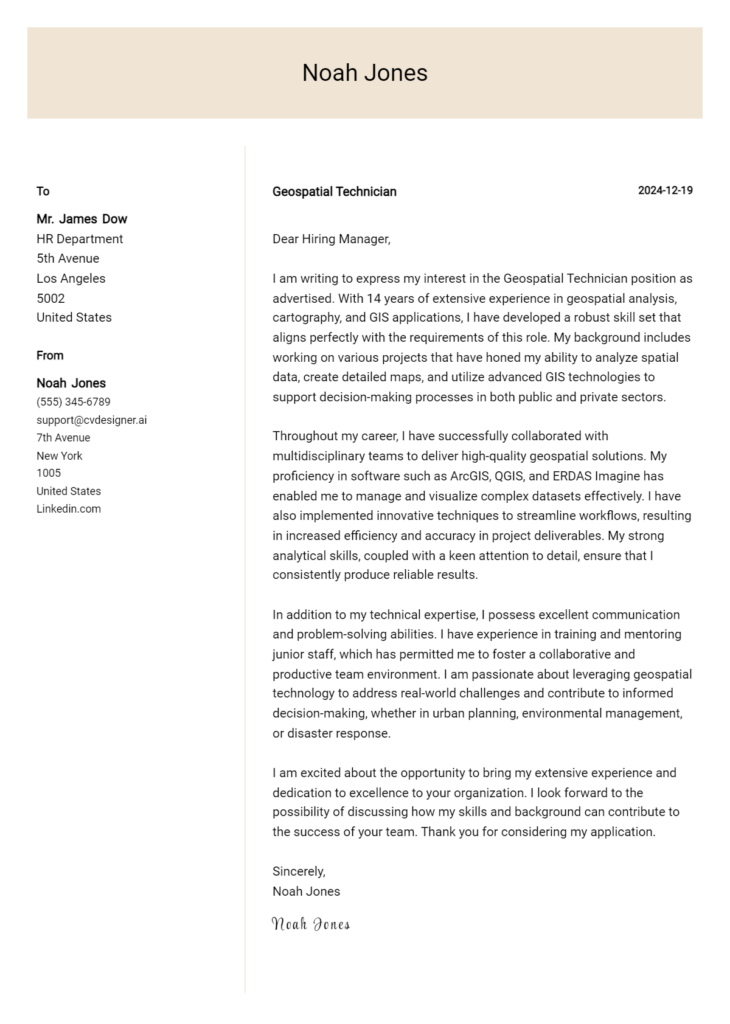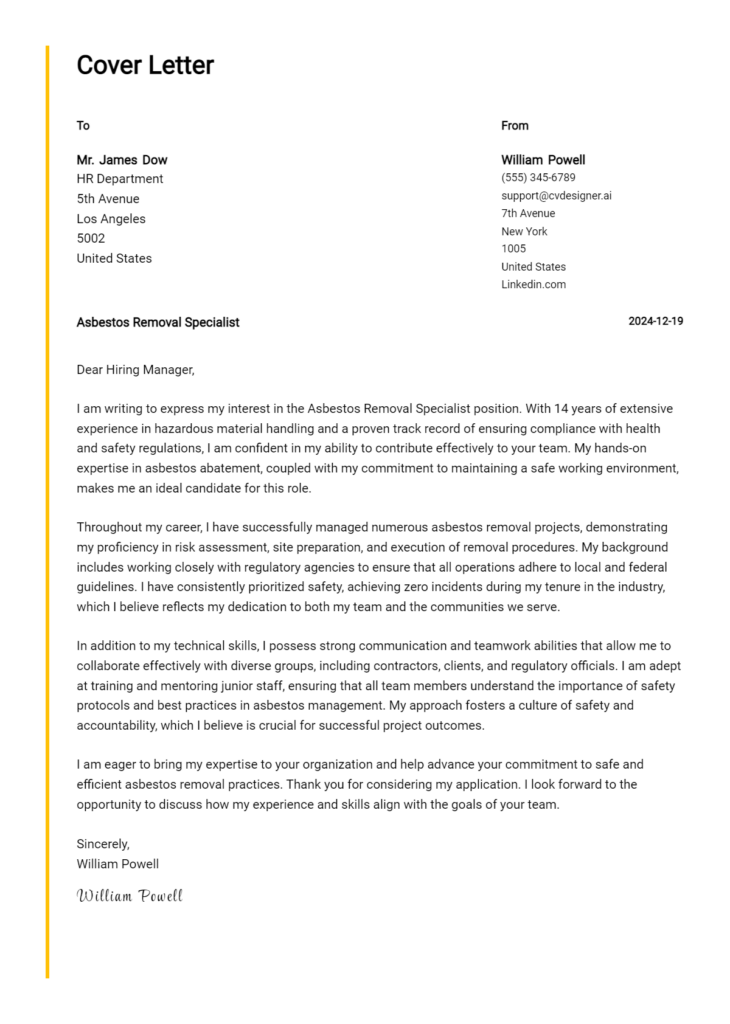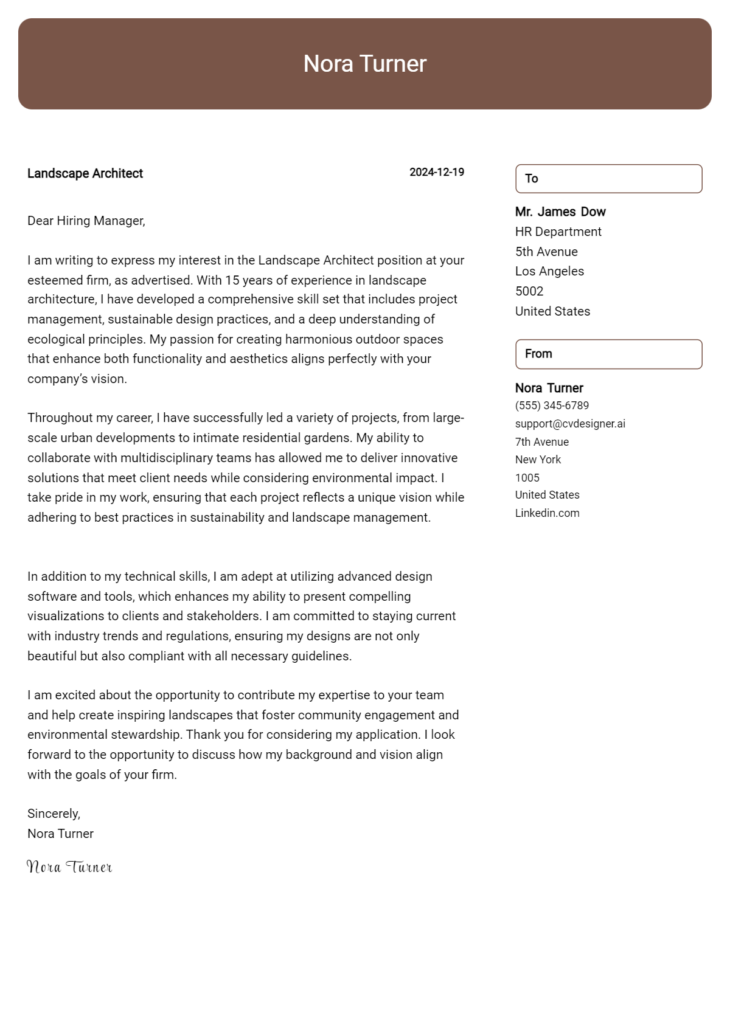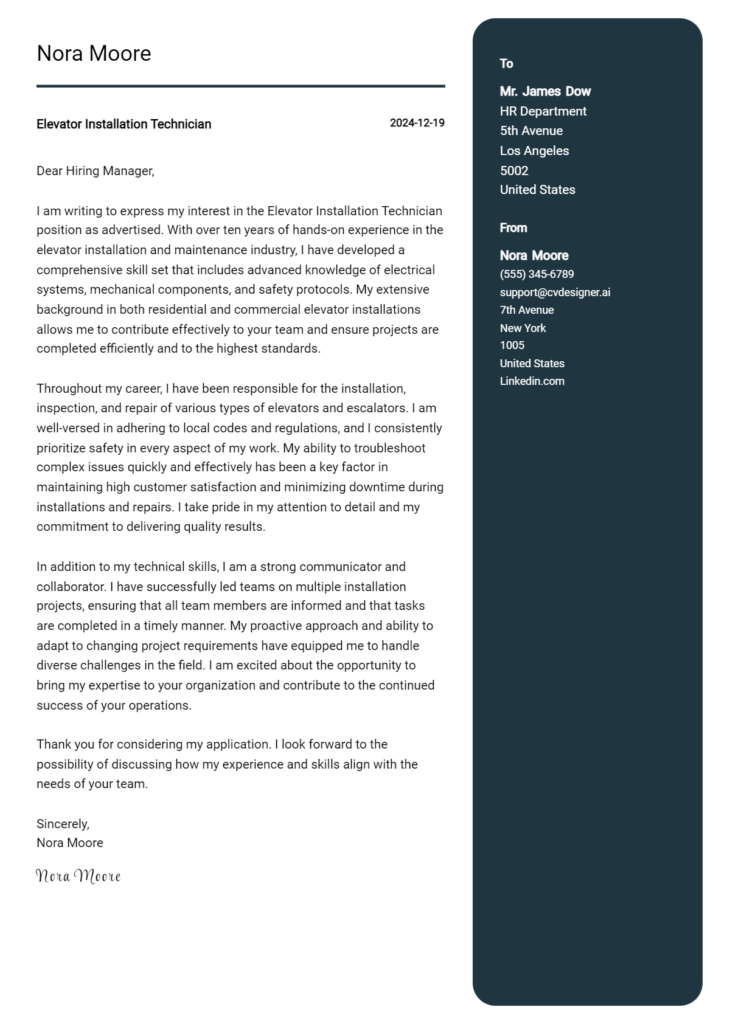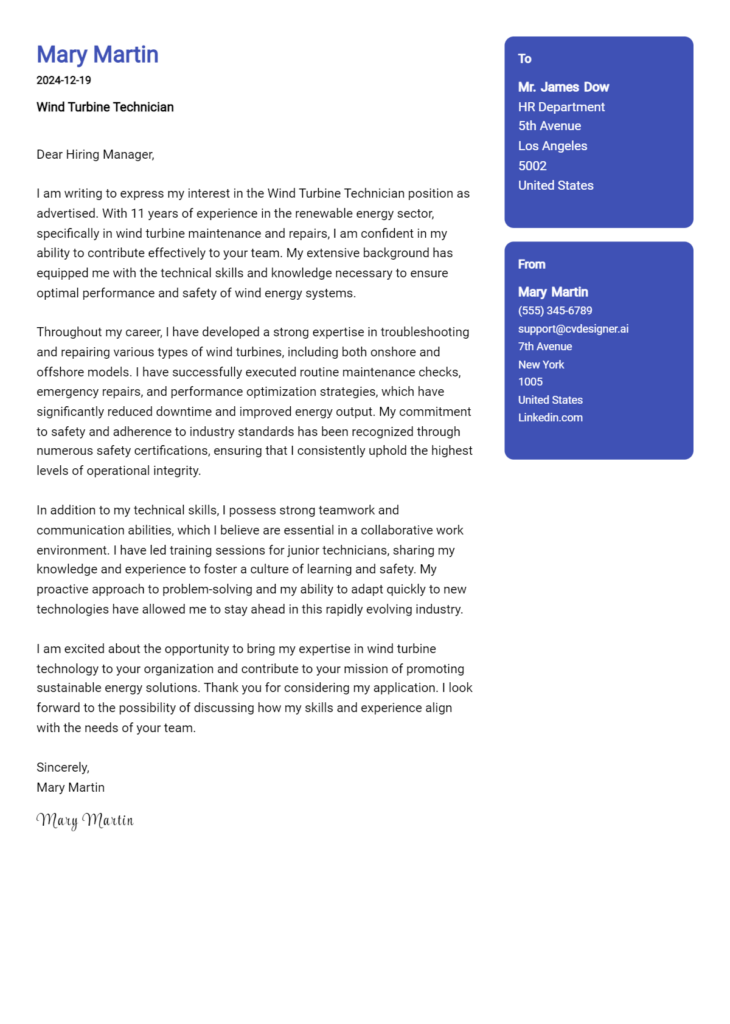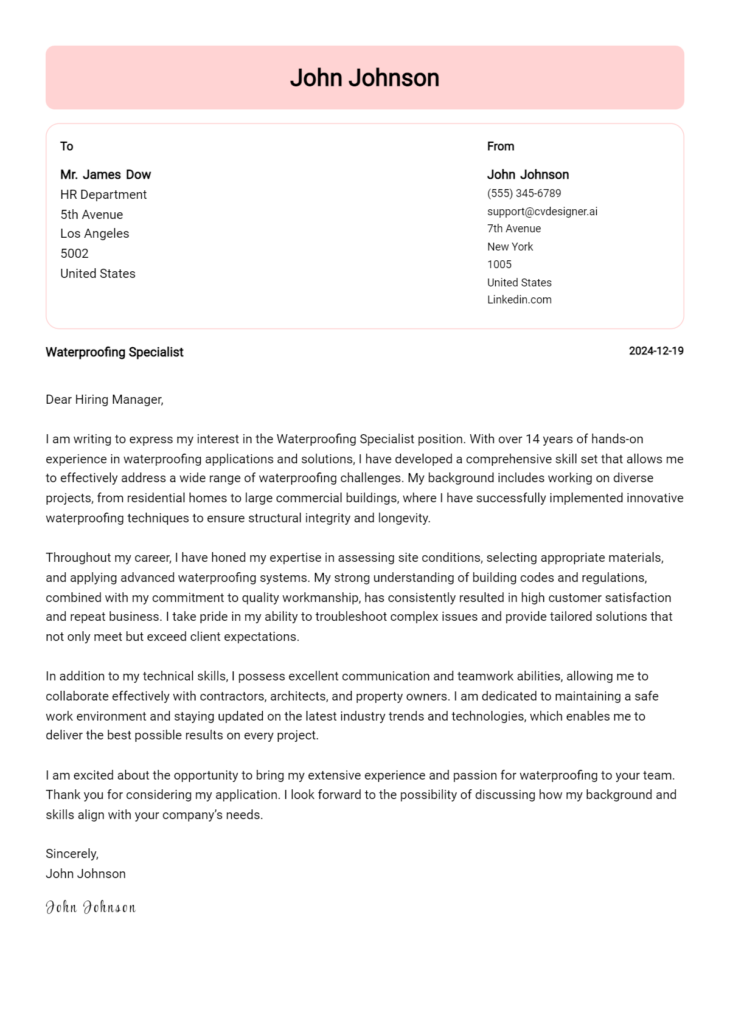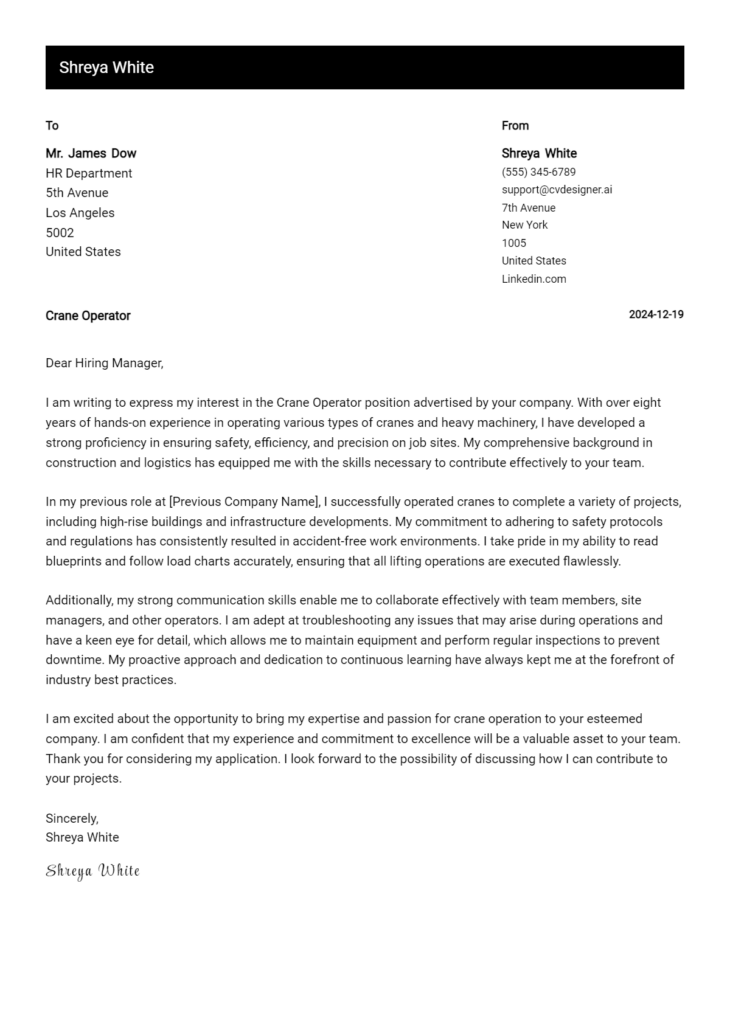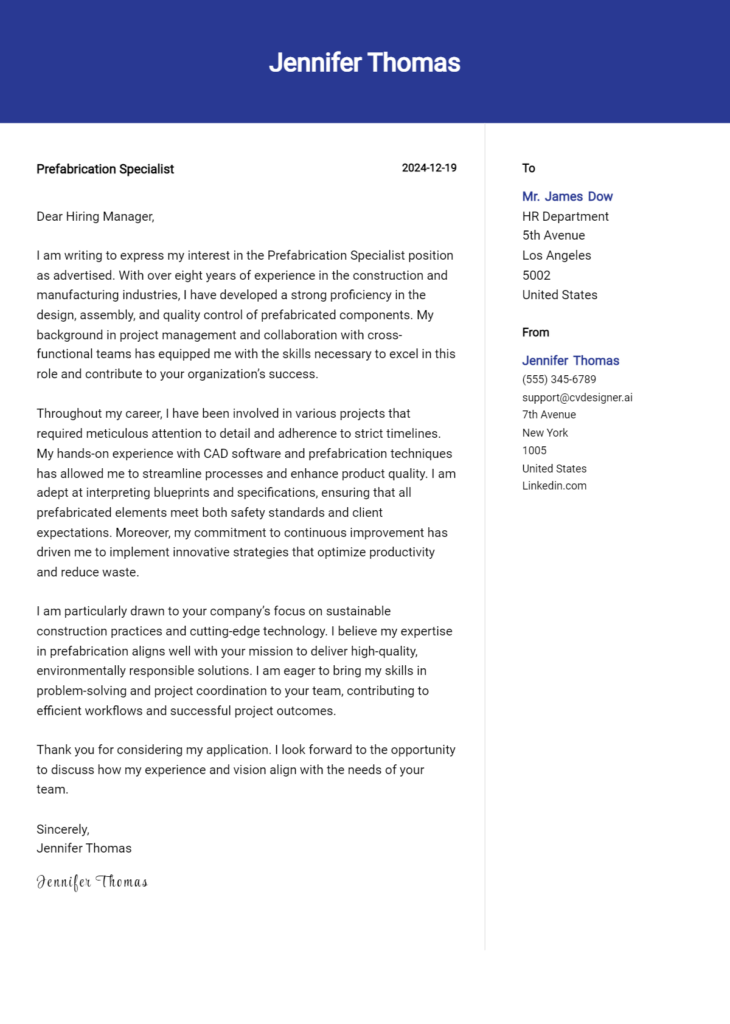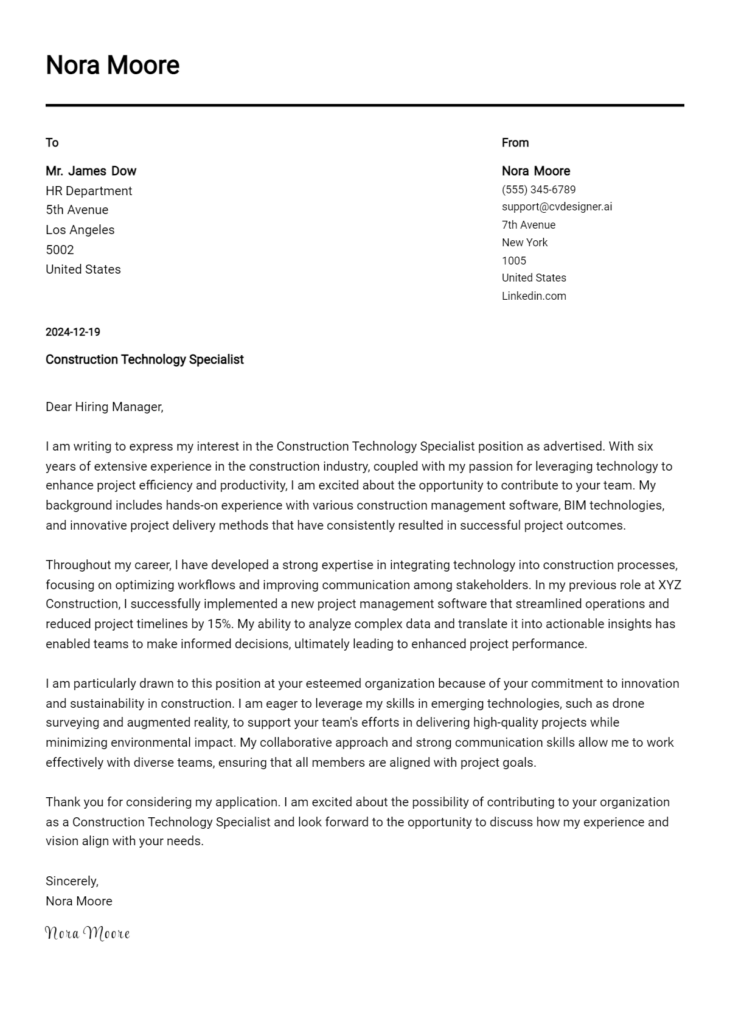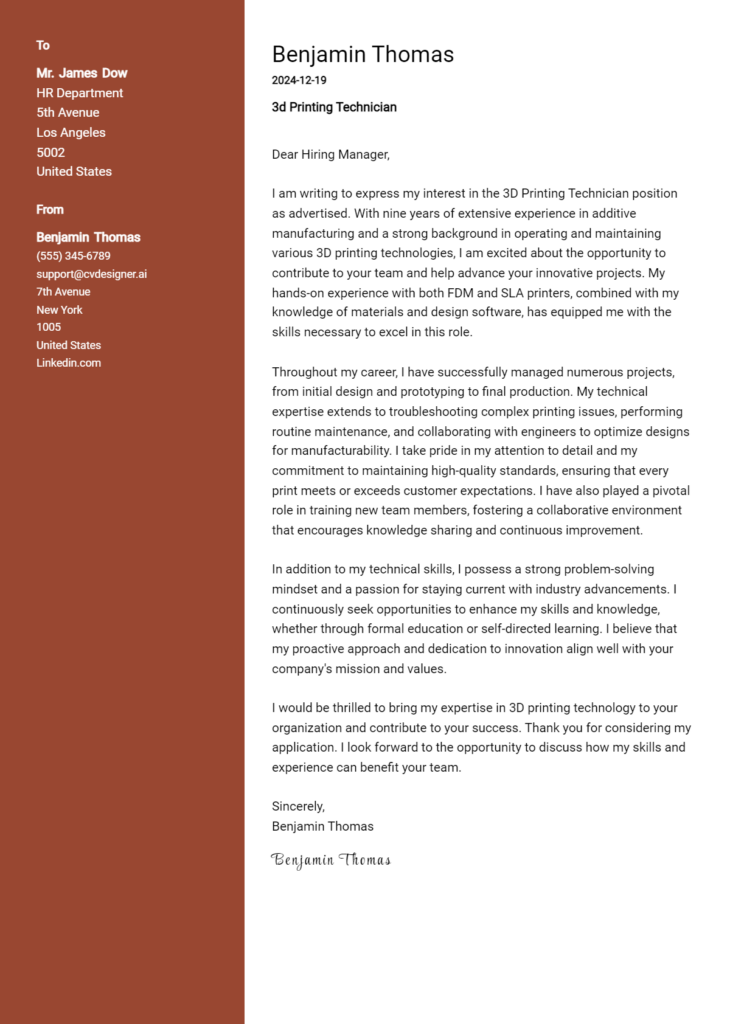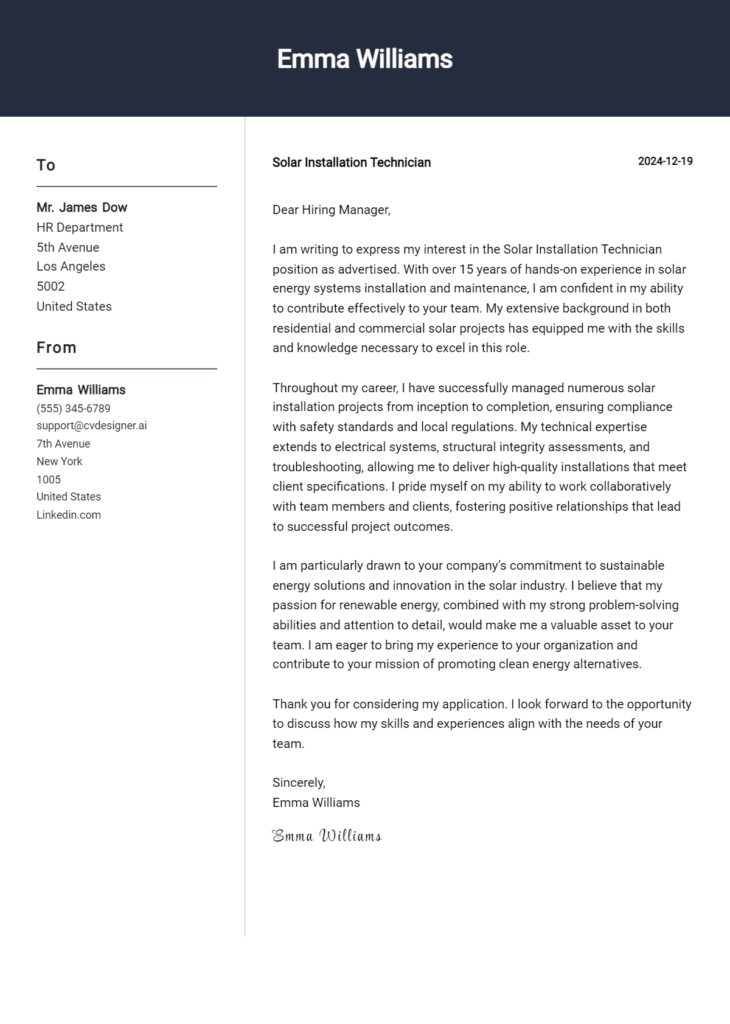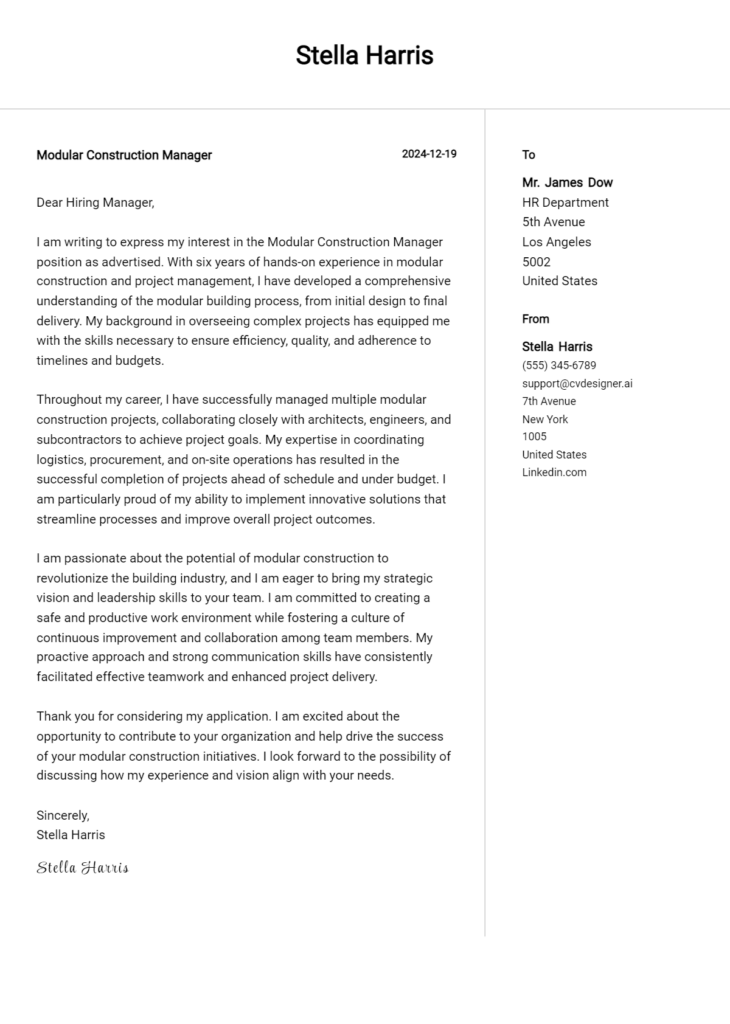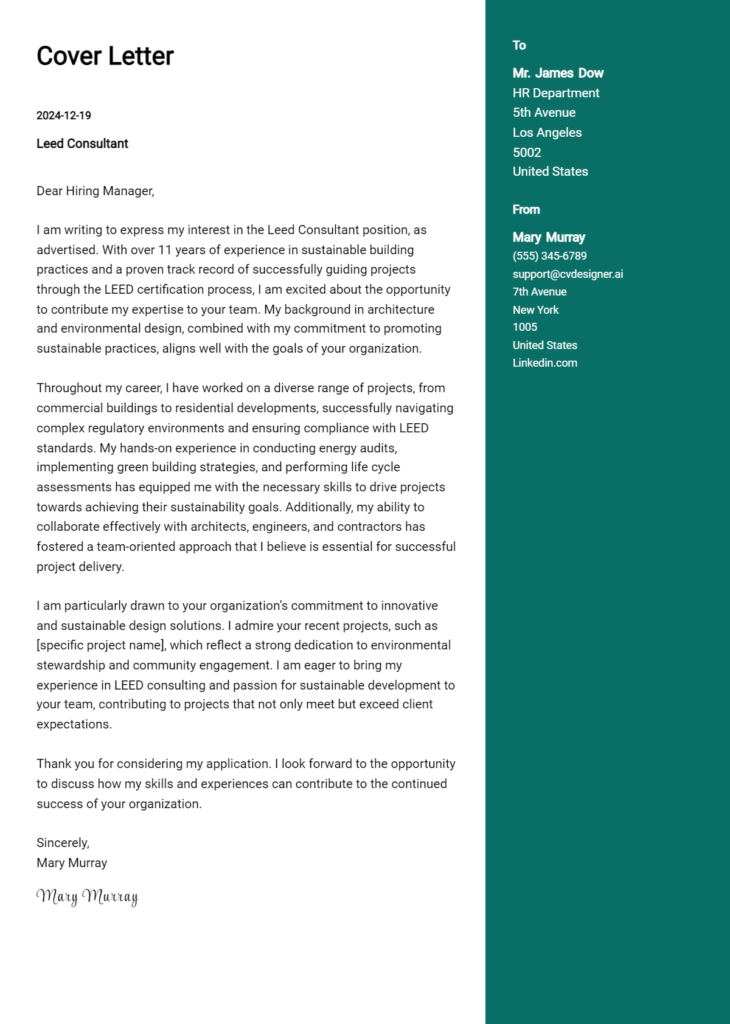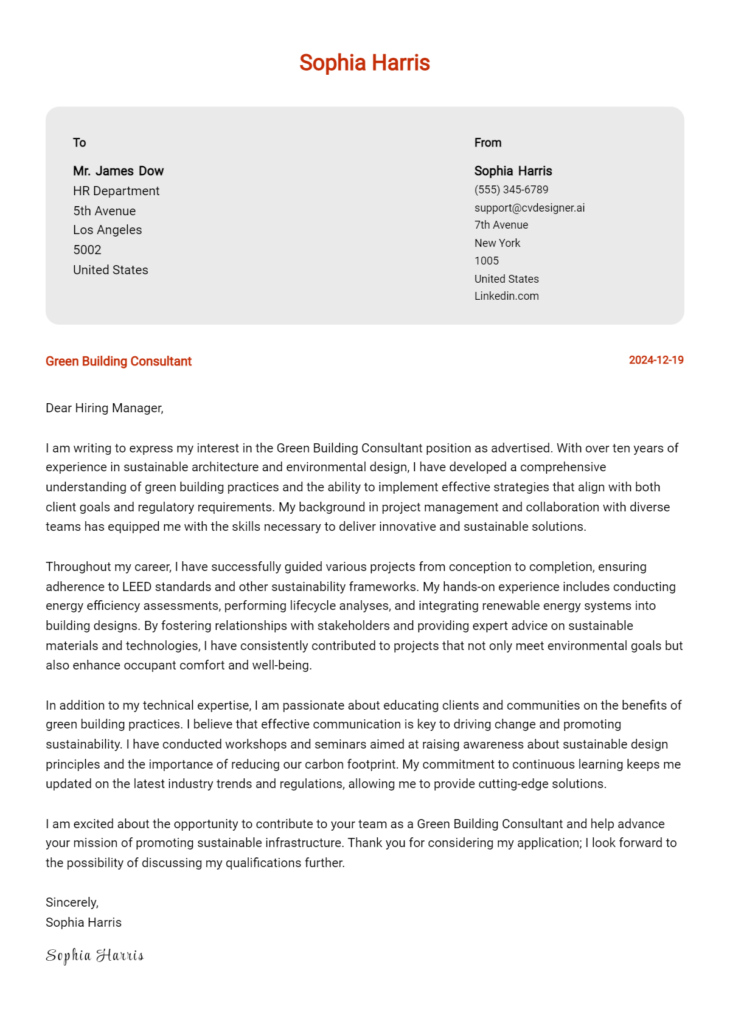Fire Protection Technician Cover Letter Examples
Explore additional Fire Protection Technician cover letter samples and guides and see what works for your level of experience or role.
How to Format a Fire Protection Technician Cover Letter?
Crafting a well-structured cover letter is crucial for a Fire Protection Technician. It not only serves as a first impression but also reflects your commitment to safety, compliance, and meticulous attention to detail—qualities that are essential in the fire protection industry. A properly formatted cover letter helps capture the hiring manager's attention while allowing you to effectively communicate your skills and experiences relevant to the role.
In this guide, we will explore how to structure your cover letter, providing insights and examples tailored specifically for the fire protection field.
We will focus on the essential components of a professional cover letter, including:
- Cover Letter Header
- Cover Letter Greeting
- Cover Letter Introduction
- Cover Letter Body
- Cover Letter Closing
Each section is vital in presenting your qualifications and professionalism. Let’s break down each part and explain how to make your fire protection technician cover letter shine.
The Importance of a Cover Letter Header for a Fire Protection Technician
A well-crafted cover letter header is crucial for a Fire Protection Technician as it creates the first impression and sets the tone for the entire application. The header should clearly display your contact information, the date of writing, and the recipient's details, ensuring that the information is easy to read and professional in appearance. Clarity in the header not only helps the hiring manager quickly identify the candidate but also reflects the attention to detail that is essential in the field of fire protection.
Here are examples of a strong and weak cover letter header for a Fire Protection Technician:
Strong Example
John Doe 123 Fire Lane Cityville, ST 12345 (123) 456-7890 johndoe@email.com [Date] Hiring Manager Fire Safety Solutions Inc. 456 Safety Blvd Cityville, ST 12345
Weak Example
JD City, ST No Phone j@email 12/01/2023 Manager Company
In the strong example, all necessary information is present and clearly formatted, while the weak example lacks essential details and professionalism, which could hinder the candidate's chances of making a positive impact.
The Importance of a Cover Letter Greeting
The greeting of a cover letter serves as the initial point of contact with the hiring manager, setting the tone for the entire application. A well-crafted greeting not only demonstrates professionalism but also personalizes your message, making you stand out as a candidate. By directly addressing the hiring manager, you show that you have taken the time to research and understand the company and its team. It's important to avoid generic greetings like "To Whom It May Concern" as they can come across as impersonal and may suggest a lack of effort. Instead, aim to find the hiring manager's name through company resources or networking. This small detail can significantly enhance your cover letter's impact.
Strong Greeting Example
Dear Ms. Smith,
Weak Greeting Example
To Whom It May Concern,
The Importance of a Well-Crafted Cover Letter Introduction for a Fire Protection Technician
A well-crafted cover letter introduction is crucial for any job application, especially for a specialized role such as a Fire Protection Technician. This opening statement sets the tone for the rest of the letter, capturing the hiring manager's attention while expressing genuine interest in the position. It serves as an opportunity to showcase key skills and relevant achievements, making a compelling case for why the candidate is the right fit for the job. A strong introduction can differentiate a candidate from the competition, paving the way for a favorable impression. Below are examples of both strong and weak introductions for a Fire Protection Technician cover letter.
Strong Example
Dear [Hiring Manager's Name], As a dedicated Fire Protection Technician with over five years of hands-on experience in fire safety systems and a proven track record of conducting successful inspections, I am excited to apply for the position at [Company Name]. My passion for safeguarding lives and property drives my commitment to excellence in fire prevention and protection, making me eager to contribute to your team’s mission of ensuring safety for all. I hold multiple certifications, including NFPA and OSHA compliance, and have successfully implemented fire safety protocols in high-risk environments, resulting in a 20% reduction in fire hazards.
Weak Example
To Whom It May Concern, I am interested in the Fire Protection Technician job at your company. I have some experience in this field and I think I could do the job. I am not sure what you are looking for, but I hope my skills will match your needs.
Cover Letter Body for Fire Protection Technician
The body of a cover letter for a Fire Protection Technician is crucial as it serves to articulate the candidate's relevant skills, experiences, and the unique value they bring to the organization. This section should provide concrete examples of past projects or accomplishments that demonstrate the candidate's technical expertise, problem-solving abilities, and commitment to safety. By highlighting specific instances, such as successful fire suppression system installations or safety audits, candidates can effectively convey their qualifications and fit for the role. This not only showcases their knowledge of fire protection standards and technologies but also illustrates their proactive approach to safeguarding lives and property.
Strong Example
Dear Hiring Manager, I am excited to apply for the Fire Protection Technician position at ABC Company. In my previous role at XYZ Corporation, I successfully led the installation of a state-of-the-art fire suppression system in a high-rise building, which involved coordinating with multiple contractors and ensuring compliance with local fire codes. This project not only enhanced the safety of over 500 residents but also resulted in a 20% reduction in insurance premiums for the property owner. Additionally, my proactive maintenance program has improved system reliability by 30%, minimizing downtime and ensuring constant readiness for emergencies. I am eager to bring my technical skills and commitment to safety to your team. Sincerely, John Doe
Weak Example
Dear Hiring Manager, I am interested in the Fire Protection Technician position. I have worked in the fire protection industry for a few years. I know how to install fire systems and do maintenance. I also think safety is important. I have done some projects, but I can’t remember all the details. I hope to work for your company because I want a job. Sincerely, John Doe
Importance of the Cover Letter Closing for a Fire Protection Technician
The closing of a cover letter is a critical component that reinforces a candidate's qualifications, expresses enthusiasm for the position, and prompts the hiring manager to take the next steps. For a Fire Protection Technician, it's essential to highlight relevant skills and experiences that align with the job requirements while also conveying a genuine interest in contributing to the safety and protection of the community. A strong closing can leave a lasting impression, encouraging the employer to review the resume and arrange an interview, while a weak closing might fail to convey the candidate's passion and readiness for the role.
Strong Example
Thank you for considering my application for the Fire Protection Technician position. With my extensive experience in fire prevention systems, coupled with my commitment to ensuring safety and compliance, I am excited about the opportunity to contribute to your team. I would love to discuss how my skills align with your needs and share my passion for fire safety in an interview. I look forward to your response and hope to discuss this opportunity further soon.
Weak Example
I think I would be a good fit for this job. I have some experience with fire protection. Please look at my resume and let me know if you want to talk.
Crafting an effective cover letter for a Fire Protection Technician position is essential to stand out in a competitive job market. This document not only introduces you to potential employers but also highlights your unique qualifications and experiences. Emphasizing your technical skills, problem-solving abilities, knowledge of the software development life cycle (SDLC), teamwork, and commitment to continuous learning can significantly enhance your application. Here are some valuable tips to help you create a compelling cover letter that captures your strengths and enthusiasm for the role.
Tips for Writing an Effective Cover Letter
Showcase Your Technical Skills
Begin your cover letter by detailing the specific technical skills relevant to fire protection systems, such as knowledge of fire alarm systems, sprinkler systems, or fire suppression technologies. Use concrete examples of your experience with these systems in past roles to demonstrate your hands-on expertise. This will help employers see your readiness to tackle the technical demands of the job.Highlight Problem-Solving Abilities
Fire Protection Technicians often face unexpected challenges that require quick thinking and effective solutions. Share a brief story or example of a time when you identified a problem, assessed potential solutions, and implemented an effective fix. This narrative not only illustrates your problem-solving skills but also paints a picture of your proactive approach to ensuring safety.Demonstrate SDLC Knowledge
Understanding the software development life cycle can be particularly advantageous in this field, especially when working with fire safety management software. If you have experience in this area, mention it in your cover letter. Explain how your familiarity with SDLC principles can contribute to efficient project management and enhance the performance of fire protection systems.Emphasize Teamwork and Collaboration
Fire protection is a collaborative effort that often requires working alongside engineers, construction teams, and safety officers. Highlight your ability to work well in a team environment by discussing your experiences in previous roles where collaboration was key to project success. Mention any specific teamwork skills, such as communication or conflict resolution, that you possess.Express a Passion for Continuous Learning
The fire protection industry is always evolving, with new technologies and regulations emerging regularly. Express your commitment to continuous learning by mentioning any relevant certifications, workshops, or courses you have completed or plan to pursue. This not only shows your dedication to the field but also reassures employers that you are proactive about staying updated with industry trends.
By incorporating these tips into your cover letter, you can create a strong impression that showcases your qualifications and enthusiasm for the Fire Protection Technician role. For additional guidance, consider using cover letter templates or a cover letter builder to streamline the writing process.
Common Mistakes to Avoid in a Fire Protection Technician Cover Letter
Crafting a compelling cover letter is essential for standing out in the competitive field of fire protection. Avoiding common mistakes can significantly enhance your chances of making a positive impression on potential employers. Here are some frequent pitfalls to watch out for:
Generic Content: Using a one-size-fits-all cover letter can backfire. Tailor your letter to the specific job and company. Research the organization's values and mission to better align your content.
Neglecting the Format: A poorly formatted cover letter can detract from your qualifications. Ensure your letter follows a professional format, which you can learn more about here.
Lack of Specificity: Vague statements about your skills can leave employers unimpressed. Include specific examples of your experience and achievements related to fire protection.
Overlooking the Job Description: Failing to address key qualifications listed in the job description can make you seem unfit for the role. Highlight how your skills meet their needs.
Typos and Grammatical Errors: Simple mistakes can undermine your professionalism. Proofread your letter carefully or utilize tools to check for errors.
Focusing Too Much on Responsibilities: Instead of merely listing tasks from previous jobs, emphasize your accomplishments and how they relate to the potential role.
Ignoring the Call to Action: Concluding without a strong call to action can leave your letter feeling incomplete. End with a statement expressing your eagerness for an interview.
For more inspiration, check out some effective cover letter examples to guide you in creating an impactful letter.
Cover Letter FAQs for Fire Protection Technician
What should be included in a cover letter for a Fire Protection Technician position?
A cover letter for a Fire Protection Technician should include several key elements. Start with a strong introduction that states the position you are applying for and how you learned about it. Follow this with a brief overview of your qualifications, such as relevant certifications (e.g., NICET certification), education, and experience in fire protection systems. Highlight specific skills, such as knowledge of fire codes, system installation, and maintenance. Additionally, mention any hands-on experience with fire suppression systems, alarms, or inspections. Conclude with a compelling closing statement that expresses your enthusiasm for the role and your desire to contribute to the safety of the organization.
How do I tailor my cover letter for a specific Fire Protection Technician job?
To tailor your cover letter effectively, begin by researching the specific company and the job description. Identify key qualifications and responsibilities mentioned in the posting, and align your skills and experiences with those requirements. Use specific examples from your past work that demonstrate your ability to handle tasks like system inspections, troubleshooting, or emergency response. Incorporating relevant industry terminology can also reflect your familiarity with the field. Additionally, mention why you are particularly interested in that company, whether it’s their reputation, projects, or values related to fire safety. This personalized approach shows genuine interest and can set you apart from other candidates.
How do I demonstrate my technical skills in the cover letter?
To showcase your technical skills in your cover letter, provide specific examples of your experience with various fire protection systems, such as sprinkler systems, fire alarms, and emergency lighting. You might mention particular projects where you successfully installed, tested, or maintained such systems. Highlight any relevant certifications or training programs you have completed, and include your familiarity with industry standards and local codes. Quantifying your achievements can also be impactful; for example, stating that you reduced response time during inspections by 20% adds weight to your claims. This not only demonstrates your expertise but also your commitment to maintaining safety and compliance in the field.
Should I include soft skills in my cover letter for a Fire Protection Technician?
Yes, including soft skills in your cover letter is essential, as they complement your technical abilities. Fire Protection Technicians need strong communication skills to effectively interact with clients, provide training, or work within a team. Problem-solving skills are crucial for troubleshooting issues with fire protection systems under pressure. Mention your ability to prioritize tasks, especially in emergency situations, and your attention to detail, which is vital for compliance with safety regulations. Additionally, highlighting your adaptability can show potential employers that you can thrive in varying environments, whether it’s during inspections, installations, or emergency responses. Soft skills can differentiate you and demonstrate your suitability for the role beyond technical expertise.
Build your Cover Letter in minutes
Use an AI-powered cover letter builder and have your letter done in 5 minutes. Just select your template and our software will guide you through the process.

